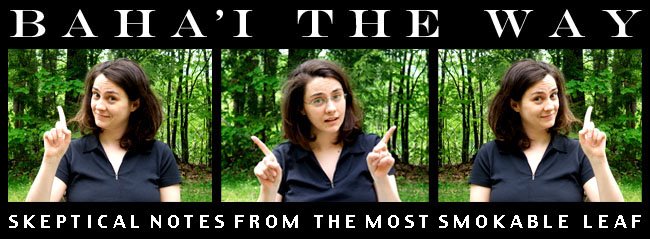 Quite a few friends and acquaintances from my Bahá’í past still don’t know I’ve withdrawn from the Faith. I haven’t withheld anything from them; we are just out of touch. The ones who matter the most to me are in Indonesia. I went there as a high-school exchange student before I’d ever heard of the Faith and went back on a year off from college to do service with the Bahá’í community. Internet connectivity is low there, so maybe I can still evade discovery by hiding behind the access disparity.
Quite a few friends and acquaintances from my Bahá’í past still don’t know I’ve withdrawn from the Faith. I haven’t withheld anything from them; we are just out of touch. The ones who matter the most to me are in Indonesia. I went there as a high-school exchange student before I’d ever heard of the Faith and went back on a year off from college to do service with the Bahá’í community. Internet connectivity is low there, so maybe I can still evade discovery by hiding behind the access disparity.
I’m afraid they won’t love me anymore, or they’ll love me with baffled pity for my wayward soul. I imagine that if I went back I could jump right into supporting whatever Bahá’í projects they had going. But could I really, even Ruhi? And why do I imagine it anyway? What am I trying to prove, at least in my own head? That I’m not, as one friend protested on my behalf, “a fallen leaf”?
How did it happen? I joined the Bahá’í Faith in part because I felt drawn to its transcendent affirmation that humanity is one people, various and diverse but somehow still one. And I liked working in practical ways to dissolve the boundaries that unnecessarily divide people. But gradually a new division was scored into my own consciousness. Crudely put, it was the division between Bahá’ís—those who get it—and non-Bahá’ís—those you’re trying to recruit, or at least supposed to be trying to recruit. From this point of view, leaving the Faith is becoming the wrong kind of person, someone who doesn’t get it. Or worse, you’re entering a third, rarely mentioned category—those who’ve lost it.
Leaving the Faith was extremely hard, and this Bahá’í/non-Bahá’í division made it feel like I was stepping out of the small circle of light and grace. I don’t know if I would ever have done it or how long it would have taken if I hadn’t had to leave for my own spiritual/psychological survival. Perhaps the remnant of this division in my consciousness is the reason why I fear the possibility of it in those friends from my past. Me with youth costumed for a holy-day performance. I am fourth from left in front.
Me with youth costumed for a holy-day performance. I am fourth from left in front.
I listened recently to a recording made for me as a going-away present by the youth and kids I worked with in Indonesia. Before listening, I wondered how it would feel now, as an outsider to the Faith, to hear all these Bahá’í songs sung by beloved people. I was surprised to find that one song in particular, one of the best, had gained new meaning by the passage of time and my withdrawal from the Faith. It’s called “Karena Bahá’u’lláh,” which means “Because of Bahá’u’lláh.” A loose translation of the part that moved me goes something like this:
Because of Bahá’u’lláh we came together.
Because of Bahá’u’lláh we are family.
Because of Bahá’u’lláh we are one.
The words have more of a ring to them in Indonesian. And the melody—lifted I think from a popular song—is very memorable. I enjoyed the song then, but mostly I loved the people. Listening to it now, the literal meaning of the words is potent for me. It is true that because of this particular 19th-century Persian man who has come to be known as Bahá’u’lláh, I met the particular people who sang this song and gave me a tape of it, and the other Bahá’ís connected to them. (You can hear the audio by clicking the Play button on the MP3 player widget at the end of this post.)
Since discovering the discussions and the resources on the Web related to the Faith, I’ve been absorbed in a critical reexamination of the Bahá’í Faith. It was sweet to have a little respite from that thinky occupation and just give thanks for the very real gift of connection to dear people that I would not have had except for the life of this man called Bahá’u’lláh.
I believe I was good for the people I worked with and for there, and I know they were good for me. It pains me now, though, to reflect that some of them, particularly those who were youth then and are now mostly married with children, might expect me to be disappointed with them, the choices they have made, how their lives have unfolded. There would be grounds in what they knew of me to hope for better, but I’m sorry to say there would also be grounds for such a fear. My time there was the apex of my devotion to the Faith. I gave everything… everything I had, and even what I didn’t, and my body has never been the same since. But I could wish that I had given, particularly to the youth, more room for their doubts and for the uncertainties in their individual lives. I could wish that I and the other adults caring for them had done less of demanding incessant activity from them and had been more ready to receive their ability to just be.
For in this world it is not good to be too eager for the achievement of any, even of the best of ends; and one who knows by experience that God is always present everywhere and always ready to make Himself known to those who love Him, will not quickly prefer the uncertain value of human activity to the tranquility and certitude of this infinite and all-important possession.
— Thomas Merton, New Seeds of Contemplation, p. 274.
I don’t think I knew by experience then that God is always present everywhere and always ready to make himself known to those who love him, though I’m sure I would have given my verbal assent to the statement. I was still trying to earn God’s love. I hadn’t yet discovered that I could simply open my hands and receive.
Monday, July 16, 2007
I'm a Little Worried
Wednesday, June 13, 2007
Sing, Sing a Song
 I once won a prize in an Indonesian beauty contest. Yes, I walked the catwalk with my face caked up beyond recognition and my hair sprayed and gelled to a smooth, crisp absurdity. The wide band around my waist, which rose to a sharp point between my breasts, was the sole fashion innovation of my get-up; my gratitude for that additional indignity goes to the host sister for whom I agreed to play pet person when I consented to participate.
I once won a prize in an Indonesian beauty contest. Yes, I walked the catwalk with my face caked up beyond recognition and my hair sprayed and gelled to a smooth, crisp absurdity. The wide band around my waist, which rose to a sharp point between my breasts, was the sole fashion innovation of my get-up; my gratitude for that additional indignity goes to the host sister for whom I agreed to play pet person when I consented to participate.
The contest was the Pemilihan Puteri Sutera, or “selection of the princess of silk.” The event was kitschy and conventional, but the tradition of silk weaving in the city of Makassar (then Ujung Pandang) which it honored is exquisite. I was the only Westerner competing, to which I attribute my capture of the title “Favorite,” though I doubt a black American would have been so readily cherished. I’m glad I signed up; it makes a great memory—one of those things one gets into early in life due to an over-developed desire to give others what they want and an under-developed self-respect, resulting in infrequent use of the word “no.”
I had my revenge, though I didn’t really intend it that way. I was just trying to survive and be a sport at the same time. There is a tradition in Indonesia of asking people to sing for large groups impromptu. Especially guests. Especially important people. It is assumed that everybody can sing, has a song ready to go on short notice, and will oblige. Someone informed me backstage that I was expected to sing before the announcement of the winners. I am not a singer. I did not think I knew all the words to any single song that I could sing . . . except maybe one:
Down on the banks of the Hanky Panks,
Where the leap frogs jump from bank to bank,
With an eep, op, oop, op,
Eesophagilley and a
[Dramatic slurping noise]
Plop!
A great American song. I had the words down solid and the tune to match, and I could sing it with confidence and gusto. So after being introduced with the gratuitous misinformation that I was very happy about the recent election of George Bush (senior) as my new president, I took the microphone in hand and, before a crowd of several hundred, did just that. A friend in the audience said my two host sisters were so mortified one almost left the room and the other looked ready to crawl under her chair. I loved them and felt a teeny weenie bit sorry for them. But, hey, my humiliation as a large, light-skinned toy had been on stage and very well lit. Maybe I did have a slight revenge pleasure in my song selection. It was just a hiccup in the contented lockdown of conventionality, a small intrusion of health and personhood. But sometimes a little disruption is appropriate.
I’m glad I signed up for the Baha’i Faith too. It saved my life by giving me much-needed personal structure at eighteen (about a year after the above story). And it continued a process, begun in Indonesia when I was living with a Muslim family, of getting over my atheism and reckoning with my own God-desire. But ultimately the Faith was party to my own near destruction, and getting out was one of the best decisions I ever made.
I don’t think my blog will have much effect on the pageant of the Baha’i Faith, but I’m gonna sing my little song anyway—even if it makes some people I love uncomfortable. There is too much control, certainty, delusion, and group-think in the Baha’i Faith, not enough reality-sense, play, open thought, and transparency. Individuals are too often used as the means to the triumph of the Faith, not cherished enough as the necessary, quirky, and particular revelations of God’s love that we are. Sometimes a little disruption is appropriate.
Plop!




